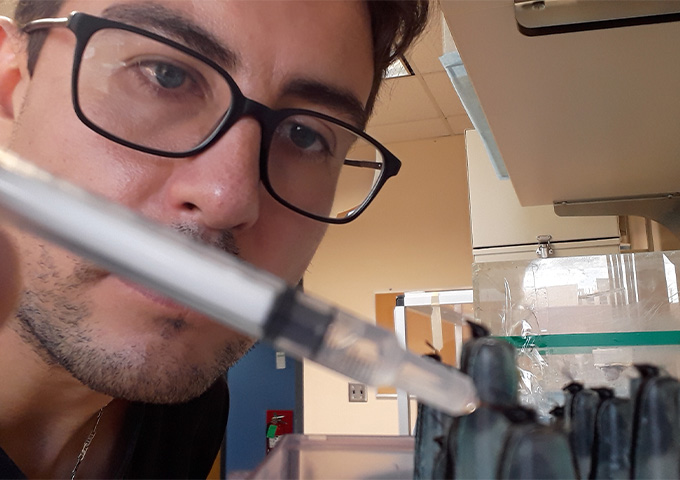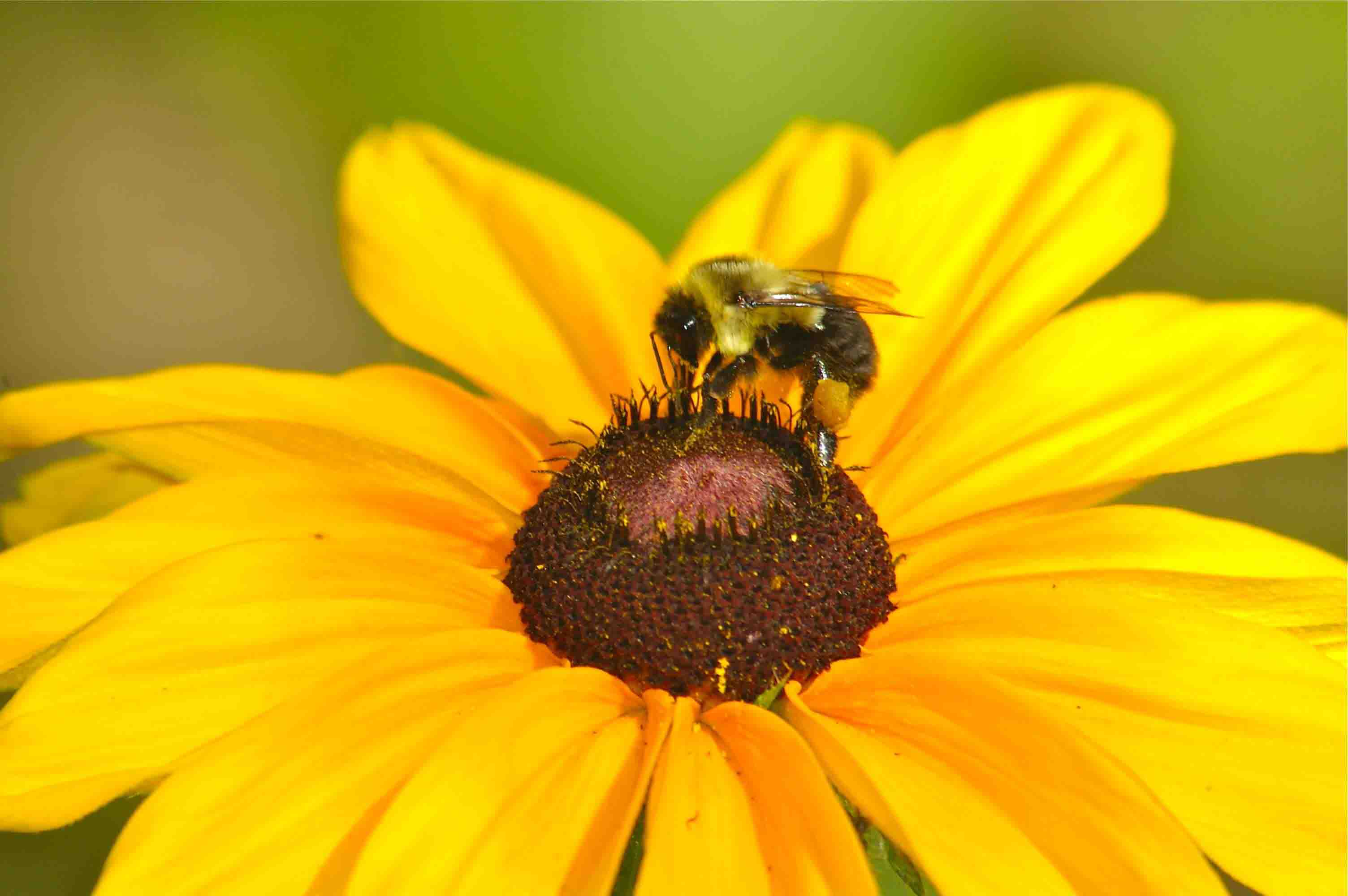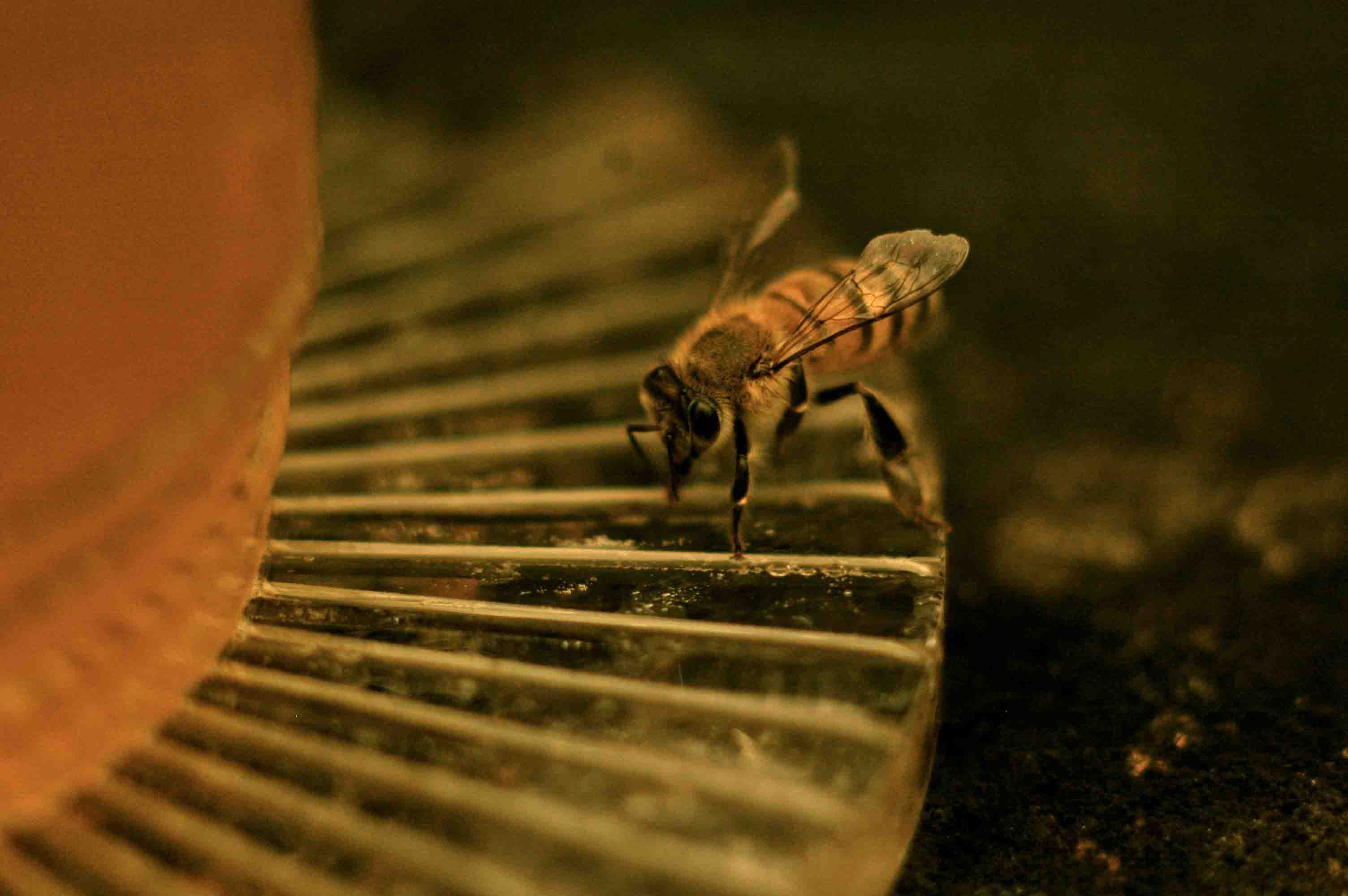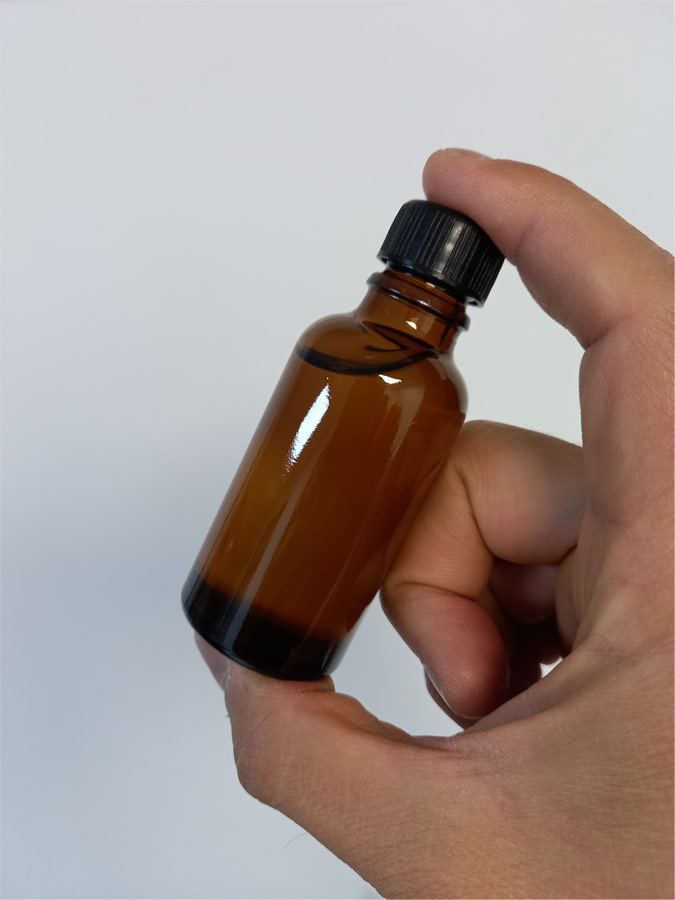An invention to protect the brains of pollinators: Flavonoids would help bees recover their memory
By: Ximena Serrano Gil
By: Ximena Serrano Gil
Ximena Serrano Gil
In a world where giants capture attention, there are minute heroes achieving feats beyond their size. We refer to bees, the little buzzers that, with brains the size of a headpin, play a vital role in maintaining the equilibrium of ecosystems and in the production of food for humanity. However, these winged heroines face a silent and lethal enemy: pesticides. The exposure to these chemicals produces sublethal effects -those that do not lead to death but impair their capacities, endangering their conservation. According to data from the Bee Informed Partnership, an NGO including researchers across several universities in the USA, between April 2022 and April 2023, beekeepers of that country lost approximately 48.2% of their hives.

“Our results suggest that the supplement designed from molecules derived from plants induces a protective effect on several areas within the brain, which would help support its use against the impairments produced by pesticides,” affirms Riveros.
Fortunately, science and nature have joined forces to protect these tireless workers. Researchers from the Faculty of Natural Sciences at the Universidad del Rosario, in alliance with the Department of Neuroscience at the University of Arizona, have developed a formula that ameliorates the impairments. Part of the results were published in the Journal of Experimental Biology.
Andre Josafat Riveros, a biologist and PhD in insect neuroscience and behavior, is also an Associate Professor at the Department of Biology at the URosario and a Research Associate at the Department of Neuroscience at UArizona, and he led the research. Riveros explains that the impairments observed in bees -produced by multiple factors, including synthetic chemical pesticides- include a decrease in learning and memory, impaired decision-making and movement and a decrease in the capacity to defend themselves against diseases. In other words, ‘You have a bee that may not remember where the flowers are or if she gets to the flowers might not remember where the hive is. Also, it is possible that she might not move efficiently among the flowers and, if facing a virus or other pathogen, she might not defend herself efficiently either’, he argues.
Our results suggest that the supplement designed from molecules derived from plants induces a protective effect on several areas within the brain, which would help support its use against the impairments produced by pesticides,” affirms Riveros.
The remedy is in the plants
The increased demand to supply a constantly rising world population, according to OECD-FAO, has led to an increase in the use of pesticides in agriculture. However, this practice has a devastating impact on bee populations, critical actors in the pollination of essential crops, as reported by the Bee Informed Partnership.
On his side, entomologist Edison Torrado-León, founder, and director of the Institute ENTOMA and professor at the Universidad Nacional de Colombia, points out that although pesticides play a significant role in protecting crops against pests, thus contributing to increased agricultural productivity and ensuring food security, the conservation of bees is also crucial. Bees serve as key pollinators for maintaining sustainable food production. Therefore, ‘it is important to find a balance between the responsible use of pesticides and the protection of bees’, he emphasizes.
The core issue is that pesticides indiscriminately target both insect pests and beneficial species, and bees are particularly affected by this. According to Andre Riveros, “we find that bees have problems with decision-making and learning”.

Two of those responsible for the impairments are fipronil and imidacloprid, neuroactive insecticides commonly used in agriculture. The former induces neuronal hyperexcitation, leading to motor impairments and problems in learning and memory retention in bees. The latter, a neonicotinoid, impairs learning, memory, motor control, and sensory sensitivity in these important pollinators, even after exposure to very low dosages.
Aiming to tackle these impairments, the researchers searched for a solution to shield the bees, focusing on flavonoids, a group of secondary metabolites derived from plants known for their antioxidant, anti-inflammatory, and protective properties, among others. Riveros explains ‘We have reasoned that if these metabolites are known for the physiological protective effects in humans, perhaps they might also protect bees’.
According to the research results, the bees fed with a diet rich in some flavonoids exhibited a significant protection against the impairments produced by pesticides. According to Riveros, “their memory was significantly better”. Additionally, the bees fed with flavonoids experienced improvements in their learning performance, decision-making and motor control, which suggests that these compounds may be key to preserving the cognitive health of these insects.
Good nutrition is necessary
This research focused on two species of pollinators: Apis mellifera (known as the honey bees and famous in cartoons as Maya the Bee), and Bombus impatiens, known as bumble bees. While these two species are the main characters, the compositions developed become a cornerstone for the conservation of the more than 20,000 species of bees around the world.
The supplement, which has intellectual property protection, has been designed specifically to help save pollinators. It consists of a mixture of molecules, of which the bees only require tiny drops. Once the bees ingest it, they start to develop protection within a few days, which has a significant impact on their survival.

A question that emerges is, what would happen if insect pests, such as moths, Thysanoptera (thrips), or mites, also ingest the supplement? Neurobiologist Riveros explains that the supplementation is provided inside of the nests of the bees, where the insect pests are not present or do not have access. We can use what beekeepers know as pollen patties, a mixture, for example, of pollen and honey, or syrup provided inside and mix them with the supplement. ‘This strategy ensures that only the bees are protected, while the pests are excluded,’ states the researcher.
An essential complement to this work is the strategy of urban gardens for pollinators. Riveros and his team propose to identify the plants that offer high quality pollen and nectar for bees. This would translate into planting specific species in urban areas, aiming to develop gardens strategically planned to provide the best nutrition for pollinators. ‘It is not only about feeding pollinators, but feeding them well’, he concludes.
Further scopes
Besides the results with these species of bees, the research conducted by the team led by Riveros at Universidad del Rosario, has further scopes. For example, when exposing the fruit fly (Drosophila melanogaster) to fipronil, the individuals exhibited behaviors reminiscent of Parkinson’s disease, mainly involuntary tremor, and rigidity, referred to as a ‘Parkinsonian phenotype’. This peculiar behavior was studied by the team in collaboration with researchers at the Universidad Nacional de Colombia in both bees and flies, and the results were also published in the Journal of Experimental Biology. They show that the flavonoids protected the fruit flies and the bees from developing the phenotype.

The scientist relied on the fruit fly because it has a shorter lifespan (approximately two weeks), reproduces fast and its genome is well characterized. These features make it an ideal model to study diverse biological and genetic processes, thus it is frequently used to test drugs or other chemical compounds.
The authors highlight the relevance of understanding the impact of pesticides on wildlife but also suggest impacts for human health. A report of the World Health Organization (2022) indicates that the prevalence of Parkinson’s disease has doubled during the last 25 years. This leads Riveros to suggest that the research with the flies might result in positive impacts for human health, because providing these natural molecules may be beneficial to all: people, bees, and flies.
The study also reveals the interconnectedness between human and environmental health while highlighting the necessity to tackle the effects of pesticides from a broader perspective, considering the consequences of these compounds on other living organisms.
The next stages of the research will focus on testing the effectiveness of the compositions as antidotes for bees that are already intoxicated with pesticides, with the goal of recovering them. Hunger is an immediate global issue, and the collaboration between scientists, farmers, and policymakers is essential to ensure a sustainable future for the planet. Advances such as the one highlighted in this article, developed through the work of researchers at Universidad del Rosario, University of Arizona, and Universidad Nacional, reflect an important step towards the protection of the bees and, consequently, the preservation of biodiversity, global food production, and public health. Flavonoids, transformed into food supplements, could be a valuable tool to reduce the negative impact of pesticides on bee populations and, ultimately, on food security for humanity.
Policies for the use of fipronil
Facing the demands for higher productivity and lower losses in crops, in 2019 more than 2 tons of pesticides were used worldwide (herbicides, insecticides, fungicides, bactericides, among others), reports a study published in the Revista de Toxicología.
The sublethal impairments associated with the exposure to insecticides, affecting individuals and colonies, have led to bans and restrictions in some countries. In Colombia, a technical report by the Corporación Colombiana de Investigación Agropecuaria (AGROSAVIA), revealed that the indiscriminate use of fipronil is closely linked to deaths. As a result, the Instituto Colombiano Agropecuario (ICA) released Resolution 740 (2023), which aims to ban the use of fipronil in the country and mitigate the negative effects this molecule.
The resolution introduces three main aspects:
The United Nation claims that we depend on the survival of bees, because ‘nearly 90% of the world’s wild flowering plant species depend, entirely, or at least in part, on animal pollination, along with more than 75% of the world’s food crops and 35% of global agricultural land. Not only do pollinators contribute directly to food security, but they are key to conserving biodiversity.’
Rector
José Alejandro Cheyne García
Vicerrector
Gustavo Adolfo Quintero Hernández
Síndico
Juan Manuel Ospina Sanmiguel
Secretario General
Germán Villegas González
Decana Facultad de Ciencias Naturales
Geimy Carolina Pardo Díaz
Directora de Marketing
María Claudia Rojas Álvarez
Directora Comunicaciones y Reputación Institucional
María Angélica Moya López
Mara Brugés Polo
Coordinadora Divulgación Científica
Dirección de Investigación e Innovación
Luisa María Franco Perilla
Profesional Divulgación Científica
Dirección de Investigación e Innovación
Ximena Serrano Gil
Periodista científica
Ismael Enrique Iriarte Ramírez
Digital Project Manager
Dirección Tecnología, Informática y Comunicaciones UR
Jorge Mario Castro Ocampo
Técnico Producción Radial
Escuela Ciencias Humanas
Emisora URosario Radio
Natalia Preciado Gutiérrez
Editor Contenido Virtual
Angélica María Cabrera Trujillo
Editor Contenido Virtual
John Jairo Rincon Florez
Editor Contenido Virtual
Alfio Efrén Barragán Castillo
Diseñador web
Bogotá, Colombia.
Febrero 2024
Investigador principal: Andre Josafat Riveros Rivera
Doctorado en Entomología Aplicada, University of Arizona
Profesor asociado de carrera - Facultad de Ciencias Naturales
Correo electrónico: andre.riveros@urosario.edu.co
Líneas de investigación: - Eco fisiología y cognición
- Fisiología traslacional